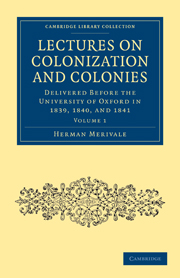 Lectures on Colonization and Colonies
Lectures on Colonization and Colonies Summary
The chief advantages of colonization to the mother country (economically speaking) are twofold: the opening of new sources of production, whence articles of necessity, conveniences, and luxury may be obtained more cheaply or more abundantly than heretofore from the unexhausted resources of a new soil; the opening new markets for the disposal of the commodities of the mother country, more profitable and more rapidly extending than those previously resorted to, by reason of the speedy growth of wealth in new communities. I have mentioned these two as separate advantages, in order to adopt, as far as possible, the popular language; yet, in point of fact, importation, not exportation, is the great interest of a country; not the disposal of her own commodities, but the obtaining other commodities in return. The first is only useful as a means to the last; and yet, it is singular to observe, how the latter object, that of importation, is overlooked in ordinary reasoning on the subject, as if the only benefit of colonies resulted to our producers—our merchants and manufacturers; and not to our consumers, that is, to the great bulk of the people. This strange omission is in reality the consequence of those very narrow views of commercial policy, which have become so inveterate by long indulgence, that even those who are convinced of their futility can scarcely shake off the prejudices produced by them.
- Type
- Chapter
- Information
- Lectures on Colonization and ColoniesDelivered before the University of Oxford in 1839, 1840, and 1841, pp. 183 - 205Publisher: Cambridge University PressPrint publication year: 2010First published in: 1841
